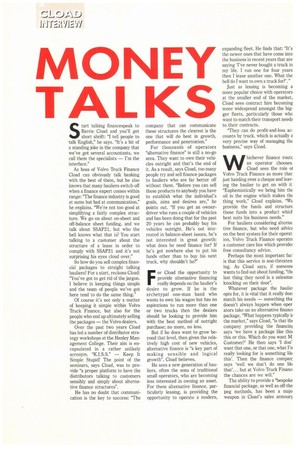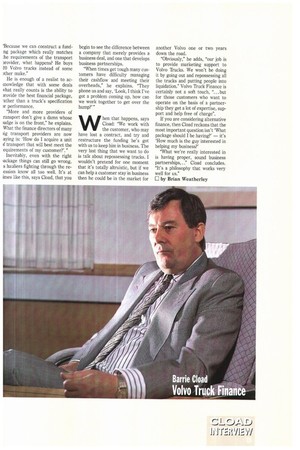MONEY TAL
Page 98

Page 99

If you've noticed an error in this article please click here to report it so we can fix it.
Start talking financespeak to Barrie Cload and you'll get short shrift: "I tell people to talk English," he says. "It's a bit of a standing joke in the company that we've got several accountants, we call them the specialists — I'm the interface."
As boss of Volvo Truck Finance Cload can obviously talk banking with the best of them, but he also knows that many hauliers switch off when a finance expert comes within range: "The finance industry is good at sums but bad at communication," he explains. "We're not too good at simplifying a fairly complex structure. We go on about on-sheet and off-balance sheet funding, and we talk about SSAP21, but who the hell knows what that is? You start talking to a customer about the structure of a lease in order to comply with SSAP21 and it's not surprising his eyes cloud over."
So how do you sell complex financial packages to straight talking hauliers? For a start, reckons Cload: "You've got to get rid of the jargon. I believe in keeping things simple and the team of people we've got here tend to do the same thing."
Of course it's not only a matter of keeping it simple within Volvo Truck Finance, but also for the people who end up ultimately selling the packages — the Volvo dealers.
Over the past two years Cload has led a number of distributor strategy workshops at the Henley Management College. Their aim is encapsulated in a rather unlikely acronym. "K.I.S.S." — Keep It Simple Stupid! The point of the seminars, says Cload, was to provide "a proper platform to have the distributors talking to customers sensibly and simply about alternative finance structures".
He has no doubt that communication is the key to success: "The company that can communicate these structures the clearest is the one that will do best in growth, performance and penetration."
For thousands of operators "alternative finance" is still a no-go area. They want to own their vehicles outright and that's the end of it. As a result, says Cload, too many people try and sell finance packages to hauliers who are far better off without them. "Before you can sell these products to anybody you have to establish what the individual's goals, aims and desires are," he points out. 'If you get an ownerdriver who runs a couple of vehicles and has been doing that for the past 20 years he can probably buy his vehicles outright. He's not interested in balance-sheet issues, he's not interested in great growth: what does he need finance for? If he's got nowhere else to put his funds other than to buy his next truck, why shouldn't he?"
For Cload the opportunity to provide alternative financing really depends on the haulier's desire to grow. If he is the archetypal one-man band who wants to own his wagon but has no aspirations to run more than one or two trucks then the dealers should be looking to provide him with the best method of outright purchase; no more, no less.
But if he does want to grow beyond that level, then given the relatively high cost of new vehicles, alternative finance is "a key part of making sensible and logical growth", Cload believes.
He sees a new generation of hauliers, often the sons of traditional small operators, who are becoming less interested in owning an asset. For them alternative finance, particularly leasing, is providing the opportunity to operate a modern, expanding fleet. He fmds that: "It's the newer ones that have come into the business in recent years that are saying 'I've never bought a truck in my life. I run one for four years then I lease another one. What the hell do I want to own a truck for?'."
Just as leasing is becoming a more popular choice with operators at the smaller end of the market, Cload sees contract hire becoming more widespread amongst the bigger fleets, particularly those who want to match their transport needs to their contracts.
They can do profit-and-loss accounts by truck, which is actually a very precise way of managing the business," says Cload.
Whichever finance route an operator chooses: Cload sees the role of Volvo Truck Finance as more thar just handing over a cheque and leaving the haulier to get on with it: "Euphemistically we bring him the oil in the engine which makes the thing work," Cload explains. "We provide the funds and structure those funds into a product whict best suits his business needs."
For hauliers considering alterna. tive finance, but who need advice on the best system for their operat ion, Volvo Truck Finance operate! a customer care line which provide! free consultancy advice.
Perhaps the most important fac' is that this service is non-threaten ing. As Cload says, if someom wants to find out about funding, "th( last thing they need is a salesmat knocking on their door".
Whatever package the haulie: opts for, it is vital that it really doe: match his needs — something tha doesn't always happen when oper ators take on an alternative finano package. "What happens typically ii the market," says Cload, "is that till company providing the financim says 'we have a package like this this or this. Which do you want M Customer?' He then says 'I don' want that one, or that one, what I'n really looking for is something lik, this'. Then the finance compan: says 'well we don't do one Lilo that'... but at Volvo Truck Finano the chances are we will."
The ability to provide a "bespoke financial package, as well as off-the peg methods, has been a majo weapon in Cload's sales armoury 'Because we can construct a fundng package which really matches :he requirements of the transport )rovider, what happens? He buys ?(:1 Volvo trucks instead of some )ther make."
He is enough of a realist to actnowledge that with some deals what really counts is the ability to rovide the best financial package, .ather than a truck's specification )1. performance.
"More and more providers of ransport don't give a damn whose iadge is on the front," he explains. What the finance directors of many ig transport providers are now ,aying is: 'How do I acquire a unit d' transport that will best meet the equirements of my customer?'." Inevitably, even with the right ■ ackage things can still go wrong, s hauliers fighting through the reession know all too well. It's at imes like this, says Cload, that you begin to see the difference between a company that merely provides a business deal, and one that develops business partnerships, "When times get tough many customers have difficulty managing their cashflow and meeting their overheads," he explains. 'They phone us and say, 'Look, I think I've got a problem coming up, how can we work together to get over the hump?'"
When that happens, says Cload: "We work with the customer, who may have lost a contract, and try and restructure the funding he's got with us to keep him in business. The very last thing that we want to do is talk about repossessing trucks. I wouldn't pretend for one moment that it's totally altruistic, but if we can help a customer stay in business then he could be in the market for
another Volvo one or two years down the road.
'Obviously," he adds, "our job is to provide marketing support to Volvo Trucks. We won't be doing it by going out and repossessing all the trucks and putting people into liquidation." Volvo Truck Finance is certainly not a soft touch, "...but for those customers who want to operate on the basis of a partnership they get a lot of expertise, support and help free of charge".
If you are considering alternative finance, then Cload reckons that the most important question isn't 'What package should I be having?' — it's 'How much is the guy interested in helping my business?'
"What we're really interested in is having proper, sound business partnerships, .." Cload concludes. "It's a philosophy that works very well for us."
ID by Brian Weatherley




































































































